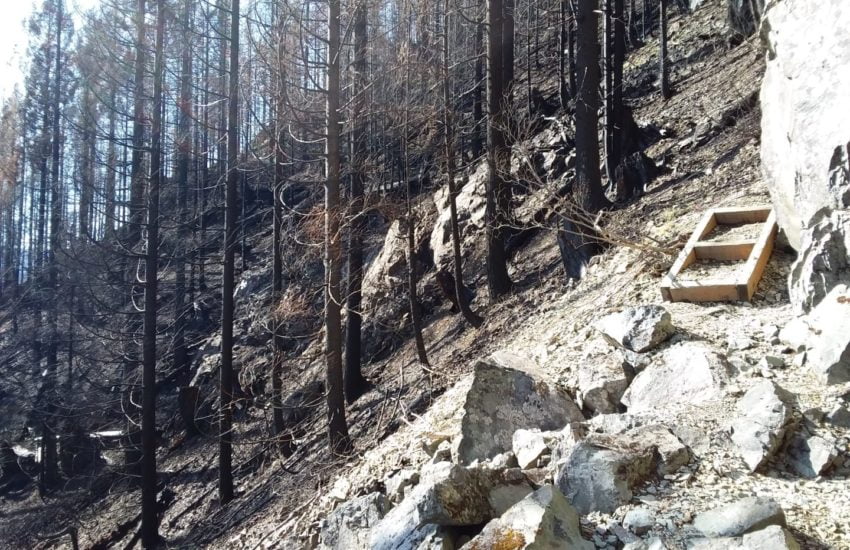
A two-year effort by the California Department of Fish and Wildlife (CDFW) to monitor a popular northern California “dumping ground” for hazardous materials has been very successful. Dubbed the Pollution Patrols, this operation has resulted in 34 citations, multiple towed vehicles and three felony arrests over the last 24 months.

Since early 2018, CDFW’s Law Enforcement Division has received many complaints regarding illegal dumping of petroleum products, garbage and various hazardous materials in and around Dry Creek near the border of Placer and Sacramento counties. This remote area, which is home to many fish and wildlife species, was regularly being used as a trash dumping site for everything from broken household appliances to hazardous waste and stolen cars.
“We set up a surveillance patrol one night, simply hiding nearby and waiting to see if someone would come by and dump their waste,” said lead investigator Warden Ryan Hanson of CDFW’s Office of Spill Prevention and Response. “At first we weren’t sure if the effort would pay off … but it paid off immediately.”

After their initial success, Warden Hanson and fellow wildlife officers set up 19 more pollution patrols in the area. It quickly became clear that the location was a hotspot for illegal activity, and officers rarely had a dull night.
Not all of the law enforcement actions taken were pollution related. During one of the pollution patrols, wildlife officers observed a vehicle stop briefly right in the middle of the road before driving off. When the vehicle left, Warden Hanson drove to the spot expecting to find some type of garbage strewn about. What he found was worse. Two dogs had been ejected from the vehicle and abandoned. Muzzles and leashes were still attached to both dogs, which would have prevented them from eating had they not been found by the officers. Warden Hanson stayed with the dogs while Warden Perry Schultz sped after and detained the suspect.

With the help of Placer County animal control officers and staff from the Loomis Basin Veterinary Clinic, the dogs received veterinary care right away. While one did not survive due to its extremely poor condition, the other responded to veterinary treatment and recovered over the following months, eventually being adopted into a loving home. The individual who dumped the dogs pled to a felony charge of cruelty to animals. He was sentenced to 60 days in jail, a 120-day suspended jail sentence and 40 hours of community service. He must also pay $4,000 restitution and has been given a 10-year ban on owning any dogs or pets.
Other notable cases include three separate instances of negligent discharge of a firearm, where officers witnessed suspects shooting from their vehicles in the direction of surrounding residences. In all three instances, officers stopped the suspects and took them into custody after confiscating the weapon. A total of four firearms were involved – all of which were either stolen or illegally possessed.
Yet another case involved a fire that was started near the illegal dump site. Wildlife officers had to deploy fire extinguishers and summon help from the fire department to keep the flames from approaching a residence nearby.
Throughout the duration of this effort, wildlife officers watched illegal activity unfolding right in front of them. In the dead of night, they watched individuals dispose of used motor oil and other petroleum products, paint, paint thinner and other hazardous materials, as well as tires, mattresses, construction materials and other waste. Much of the dumping occurred in Dry Creek or ditches that emptied into Dry Creek. In each case the violators were contacted, told to remove the trash they had dumped and issued citations with a written promise to appear in court for the offense.
“It’s never ok to use public property as your personal landfill,” said Warden Hanson. “It was gratifying to catch these individuals in the act, to stop them and send a message that this behavior is criminal and extremely damaging to the environment. It will not be tolerated.”
CDFW thanks the Sacramento and Placer County District Attorney’s Offices for their effort to prosecute these cases during the Pollution Patrols operation
More information about how to properly dispose of hazardous waste in Placer County or Sacramento County can be found online.
CDFW encourages the public to report environmental crimes such as water pollution and poaching to the CalTIP hotline by calling (888) 334-2258 or by texting information to “TIP411 (847411).”

